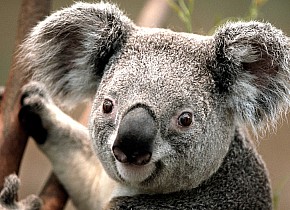Media releases
South Gippsland koalas differ from other breeds: FedUni research
Posted: Thursday 25 January 2018
Researchers at Federation University Australia’s Gippsland Campus have confirmed that the South Gippsland koala population is genetically distinct and significantly more diverse than Victorian populations established by koalas from Phillip and French Islands.
“Using DNA sourced non-invasively from koala scats, research found koalas in South Gippsland were found to have an additional 38 nuclear DNA allele variants and seven extra mitochondrial DNA sequence variants not present in the island populations assessed,” Dr Faye Wedrowicz, who has recently been awarded a PhD for this research, said.
“Relative to other Victorian koala populations, greater genetic diversity may provide South Gippsland koalas with an increased chance of survival in the face of future pressures.
“Conserving the South Gippsland koala population and its genetic diversity are therefore highly important for the long-term survival of koalas in Victoria.”
In the late 1800s and early 1900s, habitat loss, bushfires and hunting for the commercial fur trade led to widespread population declines and localised extinctions of koalas across Victoria.
Dr Wedrowicz said that mainland koala populations were later re-established throughout the state by translocation of koalas from island populations, which were founded by small numbers of koalas in the late 1800s.
“As a result, most Victorian koala populations have relatively low levels of genetic diversity,” Dr Wedrowicz said.
“Genetic diversity is important for the long-term persistence of a species as it provides populations with the capacity to cope with pressures such as disease or climate change.
“Due to a range of interacting factors, reduced genetic diversity is known to increase a population’s chance of extinction.”
The research was conducted by Dr Faye Wedrowicz and supervised by Associate Professor Jenny Mosse, Dr Fiona Hogan and Associate Professor Wendy Wright.
The South Gippsland koala population currently exists in a highly fragmented habitat. Population fragmentation and isolation are major threats to the genetic diversity that remains in the koalas of South Gippsland.
Improving habitat quality and its connectivity in the region are paramount to the conservation of koalas in South Gippsland and the greater genetic diversity that they have retained.
| Contact | Matthew Freeman Senior Advisor, Media and Government Relations 03 5327 9510; 0408 519 674 m.freeman@federation.edu.au |
|---|